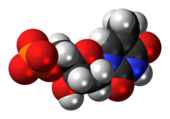Thymidine monophosphate (TMP), also known as thymidylic acid (conjugate base thymidylate), deoxythymidine monophosphate (dTMP), or deoxythymidylic acid (conjugate base deoxythymidylate), is a nucleotide that is used as a monomer in DNA. It is an ester of phosphoric acid with the nucleoside thymidine. dTMP consists of a phosphate group, the pentose sugar deoxyribose, and the nucleobase thymine. Unlike the other deoxyribonucleotides, thymidine monophosphate often does not contain the "deoxy" prefix in its name; nevertheless, its symbol often includes a "d" ("dTMP").[1] Dorland’s Illustrated Medical Dictionary[2] provides an explanation of the nomenclature variation at its entry for thymidine.
This article may be too technical for most readers to understand. (April 2022) |
 | |
 | |
| Names | |
|---|---|
| IUPAC name
Thymidine monophosphate | |
| Other names
5'-Thymidylic acid | |
| Identifiers | |
3D model (JSmol) |
|
| Abbreviations | dTMP |
| 3916216 | |
| ChEBI | |
| ChEMBL | |
| ChemSpider | |
PubChem CID |
|
| UNII | |
CompTox Dashboard (EPA) |
|
| |
| |
| Properties | |
| C10H15N2O8P | |
| Molar mass | 322.2085 g mol−1 |
Except where otherwise noted, data are given for materials in their standard state (at 25 °C [77 °F], 100 kPa).
| |
As a substituent, it is called by the prefix thymidylyl-.
See also
References
Wikiwand in your browser!
Seamless Wikipedia browsing. On steroids.
Every time you click a link to Wikipedia, Wiktionary or Wikiquote in your browser's search results, it will show the modern Wikiwand interface.
Wikiwand extension is a five stars, simple, with minimum permission required to keep your browsing private, safe and transparent.
